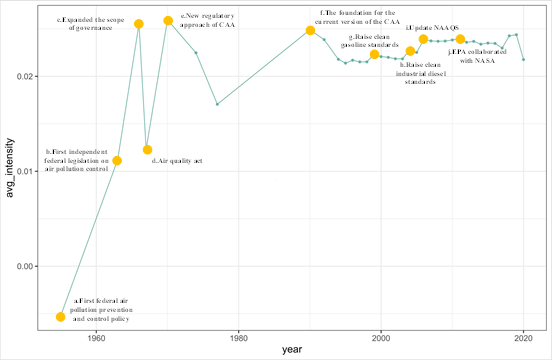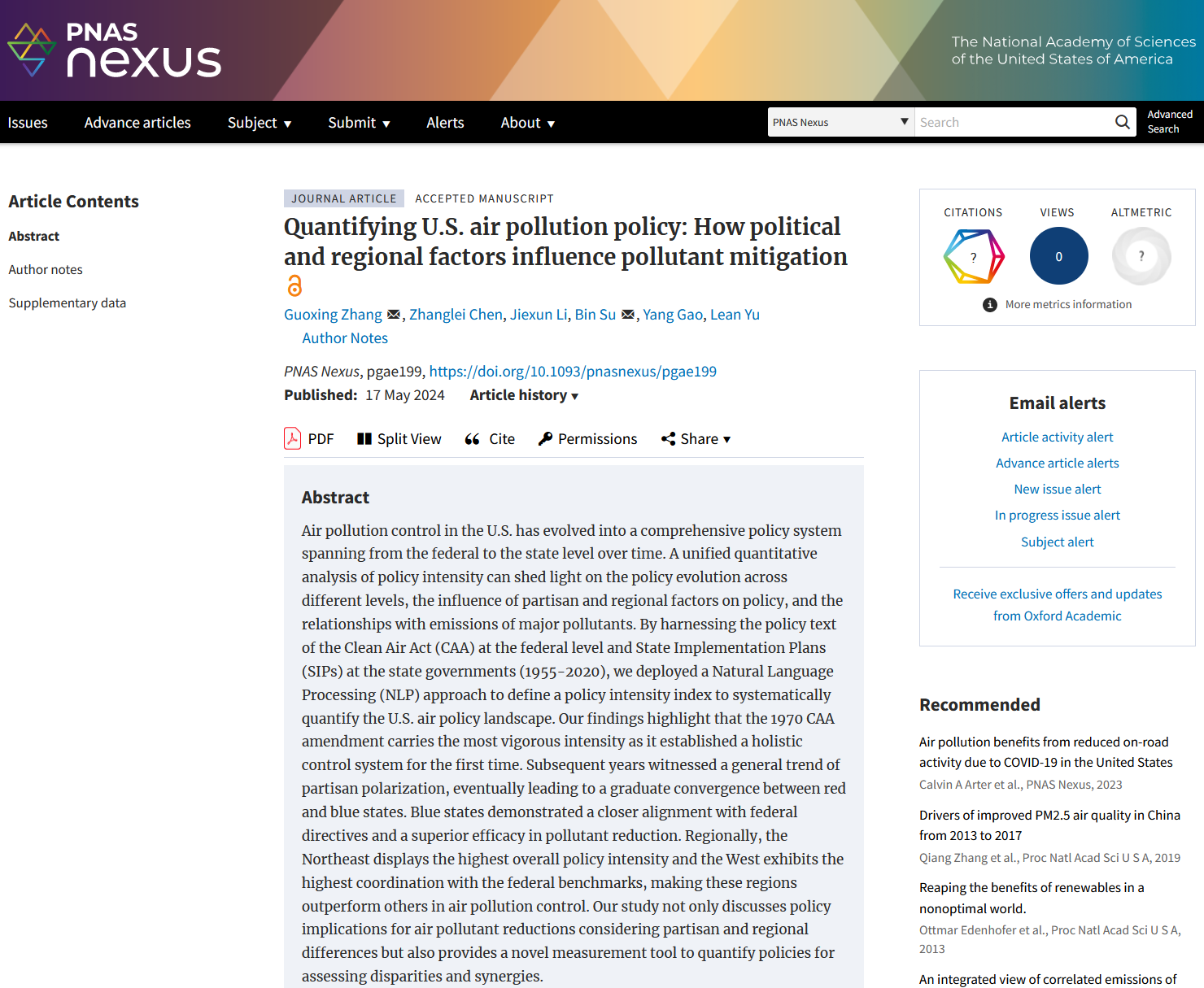News
Prof. Zhang Guoxing’s Research Team Published Outcome on the Top International Academic Journal PNAS Neuxs
The air pollution control poses a significant global challenge, and the Clean Air Act (CAA) in the U.S. has evolved into the comprehensive policy system that offers valuable insights into reducing pollutant emissions for countries worldwide grappling with similar issues. The quantitative analysis of CAA not only facilitates the comprehension of the policy’s evolution and its impact on emission reduction, but also contributes to the advancement of global researchers’ understanding of the U.S. environmental policy system at both theoretical and practical levels. Consequently, it plays a crucial role in formulating and optimizing environmental policies. However, existing studies have focused mainly on the impact of specific policies, and the lack of a systematic assessment of the broader policy system and the absence of appropriate quantitative assessment indicators have also made it difficult to reveal the patterns of synergies that have evolved at different levels of government in the governance process.
The research team led by Prof. Zhang Guoxing, in collaboration with researchers from Western Washington University and the National University of Singapore, has developed a novel approach utilizing Natural Language Processing (NLP) to measure policy intensity indicators. It enables the integration of policies at various levels into a unified assessment system, allowing for quantitative evaluation of nearly 70 years (1955-2020) of U.S. CAA at both federal and state levels. This provides an important new way to understand the patterns of policy change and synergy in the U.S. air governance system and to quantitatively reveal the impact of partisan polarization and regional factors on policy effectiveness. The study revealed that the amendment to the CAA of 1970 in the U.S. had profound implications in shaping policy systems, as it marked a milestone by establishing a comprehensive framework for air pollution control. Partisan polarization exerts influence on the trends of policy evolution, yet there has been a convergence of Democratic and Republican policies in recent years. Policies dominated by Democrats have exhibited greater alignment with federal policies and proven more effective in curbing pollutant emissions. At the regional level, the Northeast has implemented more stringent policies overall, while the West has demonstrated the highest degree of synergy with federal policies, resulting in superior performance in pollution control compared to other regions.


The research findings were published in PNAS Nexus, a prestigious international academic journal, under the title “Quantifying U.S. air pollution policy: How political and regional factors influence pollutant mitigation”. Prof. Guoxing Zhang of LUSM is the first author (co-corresponding author) of the paper, and his co-authors include his PhD students Chen Zhanglei (joint first author) and Gao Yang, Prof. Jiexun Li of Western Washington University, Prof. Bin Su of National University of Singapore (co-corresponding author), and Prof. Yu Lean of Sichuan University, with LUSM as the first signature unit. This research was supported by the Key Program of the National Natural Science Foundation of China (NSFC), the Special Program of the NSFC, the General Program of the NSFC, and the first batch of NSFC Basic Research Programs for Young Students (PhD students).

During the review process, the research results were highly recognized by the executive editor and the reviewers as “well-crafted” and “well-executed”, and “with important contributions to the literature and policy making”. The research results were reviewed and acknowledged by Yannis C. Yortsos, Editor-in-Chief of PNAS Nexus and member of the NAE, as well as Michele J. Gelfand, honorary Editor-in-Chief of PNAS Nexus and member of the National Academy of Sciences. The publication of these findings represents another significant breakthrough in Prof. Zhang Guoxing’s team’s research on quantitative assessment of environmental policy, following their previous publications in Nature and Cell in 2022, which marked a milestone progress in the field over the past seven years.
In recent years, Prof. Zhang Guoxing’s team has published more than 80 high-level papers in PNAS Nexus, Nature, Cell, Energy Economics, Journal of Environment Management, Journal of Management Sciences in China, System Engineering-Theory&Practice, Chinese Journal of Management Science and Management Review. The research results have been evaluated and reported by top journals such as PNAS, Nature Food, and media such as NASDAQ, World Bank, and China Social Sciences Net, and have been cited more than 3,000 times.





